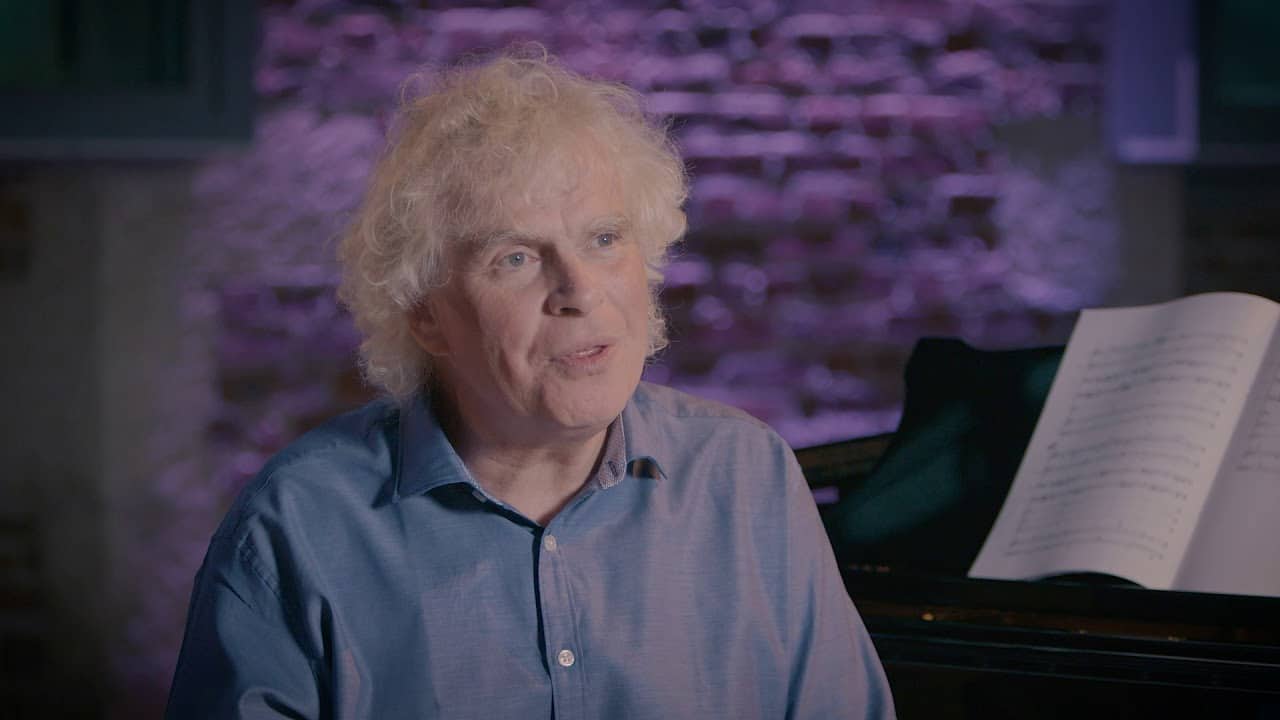Simon Rattle: Why don’t they teach this in college?
mainFrom a list of 7 things young musicians need to know:
I left the Royal Academy at 19 not knowing anything about the practicalities of life. I was 27 before I discovered that *I* was supposed to pay National Insurance, not the employer! Some poor woman came round one night to send me to jail or fine me thousands of pounds. She took pity on me when she realised: “Oh my God – this man really is that stupid.”
It is possible to have absolutely no practical knowledge of what goes on the world. A lot of musicians leave college without knowing very, very important things.
Read on here.







I am 100% in agreement, enthusiastically, with S.Rat on his “Seven essential pieces of advice for young musicians”.
Copies of this list should be sent to every music teacher worldwide for distribution to all their students, accompanied by discussion sessions.
(And perhaps to professional organizations as well!)
Really good. Great people can make wisdom seem so simple.
Yep. Good stuff.
8. You won’t get away with sexual harassment…unless you’re in Italy.
9. Pal up with a dictator, they do wonders for your career.
Depends on the dictator you choose.
Ideally one sitting on vast reserves of oil. Then money will be no object.
I’m Italian and I resent your inappropriate comment: what do you mean by that?
he means…Gatti
What a contrast to Francesca Carpos’ drivel. Thank you.
He is truly one of the treasures of living classical musicians.
I’m surprised that Sir S had National Insurance probs. You’d have thought he’d have a money person to sort out those kind of things.
It’s a very nice list though. Thanks for posting
My violin teacher graduated with a “performance” degree from a famous (American) university that otherwise had and has an excellent academic reputation. He was pretty disdainful of those who went to that music school and did not have “performance” degrees (i.e., had music education degrees). But other than becoming a huge fan of that school’s basketball team (ah, perhaps you can now guess the school?) it was shocking to me what he was allowed to come away with after four years of a so-called university education and not know. Very basic stuff including things he should have picked up in high school. I have read that prolonged exposure to cell phones can kill brain cells but sometimes I think prolonged exposure to chinrests did it first …
Re §1: I disagree — if a personal relationship requires “hard work”, is it truly a fulfilling one? Surely, one’s family is supposed to be a source of mutual support despite personal foibles (provided, of course, that such foibles do not amount to abuse… where it does so amount, estrangement is the best and only solution), rather than a source of constant anxiety over how one’s relatives feel about every little thing one says and does, whether private or public. And, for a person who is truly driven by his/her artistic endeavours, it makes perfect sense for his/her personal relationships to be conditioned by and subordinated to such endeavours. Rattle’s advice propagates an unhealthy attitude of self-blame, in that it encourages an artistic individual to view his/her artistic endeavours as a selfish distraction from any obligations to his/her family (whether financial, temporal, emotional, or otherwise). Yet, many great artists have thrived by giving precedence to their artistic work, despite objections and scepticism from family members (for example, many musicians chose to study music against the advice of parents, guardians, and relatives).
Re §2: Indeed! I would go further, and say that mistakes and failures are not only an inevitable facet of musical development, but also an essential and (within reason) productive one.
Re §3: Showing a little vulnerability may defuse tension somewhat, but it should not come at the expense of projecting a confident and assured performance. Being over-apologetic is not only embarrassing, but thoroughly uninspiring, imbuing rehearsals and performances alike with an ambience of negativity and low aspirations. You do not want to be that person. A good musician, even when beyond his/her comfort-zone or core competency, no matter the circumstances, will be positive and inspiring. Careers are forged on the back of performing brilliantly in impossible situations (e.g.: deputising at the very last minute in an unfamiliar programme, and sight-reading it so convincingly that nobody misses the original, indisposed performer), not on the back of showing vulnerability.
Re §4: Indeed! Make sure you know your tax, NI, and other obligations/liabilities. Ask the stupid questions *at the outset*, and you can avoid an expensive shock later. This also applies to discussing fees and expernses — clarify these in detail and in advance and before committing to a project firmly, otherwise you are vulnerable to being exploited and left out of pocket. Ensure there is a clear and fair protocol for handling overruns or extras (otherwise you *will* discover that what seemed like a straightforward job becomes a monstrous drain on your time and energy without a corresponding increase in renumeration!).
Re §5: Of course. As one becomes a better musician, one should be becoming *more* self-critical, *more* ambitious, and *less* satisfied with what one is producing. So, being dissatisfied with one’s performances may be a good sign of the critical acumen requisite to avoid the plague of complacency.
Re §6: At the best of times, yes, indeed. One should strive for this type of professional relationship.
Re §7: There is no *single* secret to “success”, although what Rattle mentions is relevant. Ultimately, “success” is in the eyes and ears of the beholder, so you need to decide for yourself (and be open-minded enough to adapt your definition of) what constitutes “success”, and be relaxed about the fact that your notion of “success” will differ from others’ various notions thereof.
It’s a very purposeful, rarefied atmosphere. I had lessons with great musicians, played in fine chamber groups and a wonderful symphony orchestra. Free tickets just about every night for concerts and opera.
And not a dicky about the business. If they told you about the business, half would leave. Then, where would they be?
When I got sent into the musical world of London, it was a bit of shock.
National Insurance? WTF is that? PAYG? What?!
And this was 35 years ago, and things have not changed. Just keep churning out musicians where 98% will not earn their living in music.
Not a massive deal to me, I just wish they had given clearer information upfront.
A friend tried that at the RAM last year and got fired for her trouble.
A little truth would go a long way.
In general, education does not depend on college, you can get it yourself with basic skills and a desire to learn. And you need to go to college only for a degree, and then if it is needed in the business that you will be doing. If I remember, I even wrote an essay about it, but then I used examples from https://studydriver.com/is-college-worth-it-essay/ because nothing came to my mind. But now I’m thinking about it again reading this post and I realized that college is a waste of money that is better spent on courses especially in our time. So you will need knowledge and spend less time.